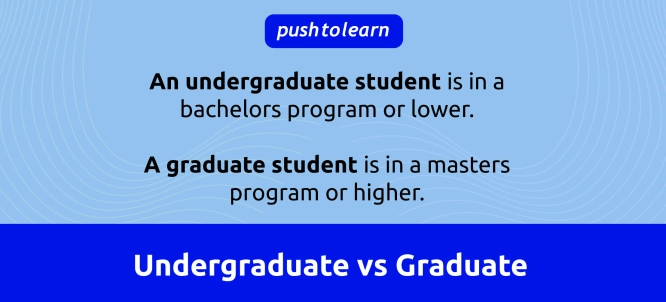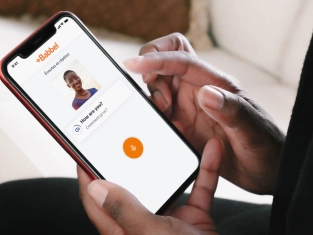by PushtoLearn
Undergraduate vs Graduate
Table of Contents
Undergraduate vs Graduate Exercises
These exercises focus on Undergraduate vs Graduate
What is an Undergraduate?
An undergraduate is a student who is studying for their first university degree, typically called a bachelor’s degree. Undergraduate programs usually last between three to four years, depending on the country and field of study. During this period, students learn foundational knowledge in their chosen subject.
Examples of undergraduate degrees:
-
Bachelor of Arts (B.A.)
-
Bachelor of Science (B.Sc.)
-
Bachelor of Business Administration (BBA)
|
Term |
Level of Education |
Degree Type |
Example |
|
Undergraduate |
First university degree |
Bachelor’s degree (B.A., B.Sc.) |
I am studying for my B.A. in History. |

What is a Graduate?
A graduate is someone who has completed their undergraduate degree and is now pursuing a higher level of education, such as a master’s degree or a doctoral degree (Ph.D.). Graduate programs focus on specialized knowledge and often involve more independent research, projects, or practical experience. These programs usually take one to two years for a master’s degree and three to five years or more for a doctoral degree.
Examples of graduate degrees:
-
Master of Arts (M.A.)
-
Master of Science (M.Sc.)
-
Doctor of Philosophy (Ph.D.)
|
Term |
Level of Education |
Degree Type |
Example |
|
Graduate |
Advanced or specialized education |
Master’s or Ph.D. |
I am pursuing an M.Sc. in Engineering. |
Key Differences Between Undergraduate and Graduate
|
Category |
Undergraduate |
Graduate |
|
Level |
First degree (Bachelor’s) |
Advanced degrees (Master’s, Ph.D.) |
|
Focus |
General knowledge and foundational skills |
Specialized, focused knowledge |
|
Program Length |
3-4 years |
1-2 years (Master’s), 3-5+ years (Ph.D.) |
|
Typical Degrees |
B.A., B.Sc., BBA |
M.A., M.Sc., Ph.D., MBA |
|
Workload |
Often more structured, with lectures and assignments |
More independent research and projects |
Common Errors
-
Confusing undergraduate and graduate levels:
-
Incorrect: I am applying for a master’s degree as an undergraduate.
-
Correct: I will be a graduate student when I start my master’s degree.
-
Assuming "graduate" means someone who finished school completely:
-
Incorrect: Since I got my bachelor’s degree, I’m done being a student forever.
-
Correct: I’m an undergraduate graduate, but I could become a graduate student later.
-
Mixing degree types:
-
Incorrect: I’m getting a B.A. in Physics (it should be B.Sc. for sciences).
-
Correct: I’m getting a B.Sc. in Physics.
Everyday Use
-
If you are starting university for the first time, you are an undergraduate student working toward a bachelor’s degree.
-
Example: I am an undergraduate student majoring in psychology.
-
If you have already completed your bachelor’s degree and are continuing your studies, you are a graduate student.
-
Example: After finishing my bachelor’s degree, I plan to become a graduate student and get a master’s in business.
FAQ
What is the difference between an undergraduate and a graduate student?
An undergraduate student is pursuing a bachelor’s degree, while a graduate student is working on an advanced degree such as a master’s or Ph.D.
Can someone be a graduate without a master’s degree?
Yes, someone is considered a graduate after completing their bachelor’s degree, but they become a graduate student if they pursue a master’s or higher degree.
Is an MBA a graduate degree?
Yes, an MBA (Master of Business Administration) is a graduate degree focused on advanced business studies.
How long is an undergraduate program?
Undergraduate programs usually last 3-4 years, depending on the country and subject.
Can I go directly from undergraduate to a Ph.D. program?
In some cases, yes. Some programs allow students to go directly from an undergraduate degree to a Ph.D. program without first completing a master’s degree.

